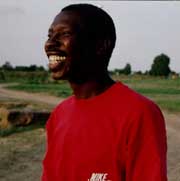Read an excerpt from
Tracy Johnston's book.
Writer Tracy Johnston made these recordings during the first of her three trips to Nigeria. We
asked Tracy to tell us more about the trip.
TRACY WRITES
I went to Kano for the first time in 1993- in search of material for a book. I wanted to see
how marriage worked when women had very little power and the needs of a family were more
important than those of any individual. I knew most Hausa women had
remained strong and happy, despite marriages we in the west would consider intolerable. How did
they do it? How did they manage to get what they wanted? And what did they tell themselves when
their husbands brought home a second, third or fourth wife?
Auwalu Kawu, who you hear on this tape, was a university professor and a lot of fun to be with.
Since the university was on strike he had plenty of spare time, so he helped me
with my research. He assumed, at first, that I wanted to hand out questionnaires, but gradually
realized I was interested in stories. I recorded this tape when he took me to the roots of his
own story – the village where his grandfather had been born.
His grandfather had been the head of Auwalu’s huge extended family and Auwalu had been his
favorite grandson. From the time he was six, Auwalu was in his grandfather’s truck, trading
goods all over west and central Africa. The family settled in Zaire in the l970s to buy and
sell smuggled ivory and gold. They grew rich until all Hausa people were kicked out of the
country -- not the first instance in Africa of "ethnic cleansing."
 "The road stopped and we had to get out and walk to his grandfather's village." Photo credit: Tracy Johnston
"The road stopped and we had to get out and walk to his grandfather's village." Photo credit: Tracy Johnston |
Auwalu’s family had been distressed when he said he wanted to get his Ph.D. – they thought it
would bring him little prestige or money. When I saw him last, in l997, he said he was
beginning to think they were right. In order to make ends meet, he and his wife, Sa’a,
started raising chickens.
I haven’t seen Auwalu in over two years, although I’d like to go back to Kano to finish the
book. I have a lot of stories about happy and unhappy marriages – my problem is when to stop
following their progress. I do know that Auwalu has recently landed a great job, working for
USAID in Nigeria. So far he has managed to keep his promise to stick with
only one wife.
ABOUT KANO
Kano is an overgrown village of about five million people in the Sahel -- a grain-growing belt
that extends all the way across Africa. It was "discovered" in l811 by a British explorer who
found a great, walled, city -- a major trading center for salt, hide and slave caravans
crossing the Sahara desert. Almost everyone in Kano is Hausa-Fulani, the Muslim ethnic group
favored by the British Colonialists when they conquered Nigeria. The generals who have ruled
the country since independence in l960 have most often been Hausa – the ones we in the west
love to hate. Just two weeks ago Kano State instituted Sharia, or Islamic law, despite the
protests of minority Christians.
ABOUT TRACY JOHNSTON
Tracy Johnston has been a journalist and magazine editor for most of her life. She is the
author of Shooting The Boh: A Woman's Voyage Down The Wildest River In Borneo, now in it's
13th printing. Tracy is presently working on a book about
Nigeria called Peace in the House. A chapter from this book, which recounts her travels with
Auwalu, is available here.
MUSIC INFO
Miriam Makeba - "SANGOMA" (South African)
(Warner Bros. Records)
CUT 17 - "UMAM' UYAJABULA" ("Mama is Happy")
The liner notes read:
"It is sung by country people who have been working in the city under
contract and who are about to return home to their loved ones. They are
saying how happy their mothers and families will be to see them again.
Here is the joy of anticipating happy reunions."
You need the free RealAudio player to listen to audio files.
Copyright © 2000 The Kitchen Sisters

